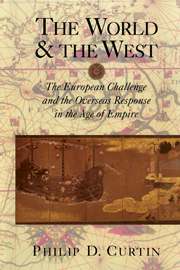Part Four - Independence and the Liquidation of Empires
Published online by Cambridge University Press: 05 June 2012
Summary
This final group of essays will be principally concerned with the 1950s through the 1970s, the central decades of the European withdrawal from political control of the non-Western world. The dramatic political changes, however, are only one phase in a longer process of culture change, which began much earlier and continued through the final quarter of the twentieth century. This account, however, will stop short near the point where the perspective of history gives way to the shorter-term (and potentially more myopic) view of current events.
The most dramatic change in these decades was the liquidation of empire. In less than a quarter-century, the Europeans gave up almost all of the overseas empires they had taken more than two centuries to acquire. European empires stopped growing after the early 1920s, when the League of Nations gave part of the former Ottoman Empire to Britain and France as mandated territories. Even earlier, there had been indications of the liquidation of empires to come. In 1917, Great Britain promised India independence, though only at some unspecified future date, and its actual achievement was postponed until after the end of the Second World War. In the first years of peace, India, Pakistan, and the Philippines became independent, and, once begun, the pace was rapid.
The homogenization of cultures the world over nevertheless continued. Nor was the direction of culture change principally from the West to the non-West; European and American cities have their sushi bars and Thai restaurants, just as Asian cities have American fast-food chains.
- Type
- Chapter
- Information
- The World and the WestThe European Challenge and the Overseas Response in the Age of Empire, pp. 193 - 194Publisher: Cambridge University PressPrint publication year: 2000



